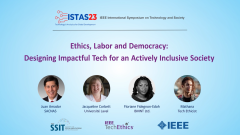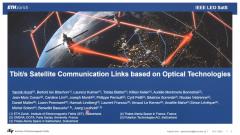Brave New Brain-Tech | IEEE TechEthics Panel
About the Video: Current/emerging neurotechnologies are being developed for use in medicine, public life, and national security operations. This panel addresses the need for neuroethico-legal guidelines and emphasizes IEEE's leadership in this space.
About the Panelists:
James Giordano, PhD, MPhil, is Professor of Neurology and Biochemistry, Chief of the Neuroethics Studies Program, and Chair of the Subprogram in Military Medical Ethics at Georgetown University Medical Center, Washington, DC, USA. Prof. Giordano chairs the IEEE Brain Initiative Neuroethics Subprogram, and is a senior member of the Neuroethics, Legal and Social Issues Advisory Panel of the Defense Advanced Research Projects Agency (DARPA). As well, he is Distinguished Visiting Professor of Brain Science, Health Promotions, and Ethics at the Coburg University of Applied Sciences, Germany, and was formerly Fulbright Visiting Professor of Neuroscience and Ethics at the Ludwig Maximilians University, Munich, Germany. He previously served as a Senior Fellow of the EU-Human Brain Project, as Senior Science Advisory Fellow to the Joint Staff of the Pentagon, and as an appointed member of the US Department of Health and Human Services' Secretary's Advisory Committee on Human Research Protections (SACHRP). His ongoing work addresses the mechanisms and treatment of neuropsychiatric spectrum disorders; and the neuroethico-legal and social issues arising in and from research and use of emerging neuroscientific techniques and technologies. The author of over 300 papers, 18 government reports and 7 books on brain science and neuroethics, he is an IEEE Distinguished Lecturer, an Overseas Fellow of the Royal Society of Medicine (UK), and in recognition of his achievements, was elected to the European Academy of Science and Arts, and the Dana Alliance of Brain Initiatives.
Francis X. Shen, JD, PhD, is the Executive Director of the Harvard MGH Center for Law, Brain, and Behavior; an Instructor in Psychology at Harvard Medical School, and an Associate Professor of Law, McKnight Presidential Fellow, and faculty member in the Graduate Program on Neuroscience at the University of Minnesota. He directs the Shen Neurolaw Lab, whose Lab motto is, "Every story is a brain story." He also serves as the Executive Director of Education and Outreach for the MacArthur Foundation Research Network on Law and Neuroscience. Dr. Shen received his B.A. from the University of Chicago, his J.D. from Harvard Law School, and his Ph.D. from Harvard University. Dr. Shen conducts empirical and legal research at the intersection of law, ethics, and neuroscience. He has co-authored 3 books, including the first Law and Neuroscience casebook (Aspen). He is currently a co-leading a Neuroethics administrative supplement grant exploring the ethical implications of mobile neuroimaging by embedding neuroethics research into the parent NIH BRAIN grant "Imaging Human Brain Function with Minimal Mobility Restrictions" (Mike Garwood, PI). He also served as a member of the National Institutes of Health Neuroethics Subgroup. In spring 2020, he will co-teach Neuroethics at Harvard Medical School and co-teach Law and Neuroscience at Harvard Law School.
Laura Specker Sullivan, a specialist in interdisciplinary and cross-cultural ethics, is an Assistant Professor of Philosophy at the College of Charleston and the Director of Ethics at the Medical University of South Carolina. She has held fellowships at the Center for Bioethics, Harvard Medical School, the Center for Sensorimotor Neural Engineering, University of Washington, the National Core for Neuroethics, University of British Columbia, and the Kokoro Research Center, Kyoto University. She received her PhD in Philosophy from the University of Hawaii at Manoa. She is a member of the IEEE TechEthics Ad Hoc Committee, the former chair of the Neuroethics Affinity Group for the American Society for Bioethics and Humanities, and is a current member of the Philosophy and Medicine committee of the American Philosophical Association.
William (Jamie) Tyler is an associate professor in the School of Biological and Health Systems Engineering at Arizona State University. His group's primary research and development interests focus on developing and applying noninvasive neuromodulation methods and devices intended to optimize human performance and brain health. His team is particularly interested in developing electrical, ultrasonic, and alternative technologies or interfaces that are capable of precisely regulating the human autonomic nervous system, as well as deep-brain circuits to regulate arousal, attention, learning, and sleep/wake cycles. In addition to developing methods and tools for enhancing human performance, the Tyler lab also works on developing technologies that can be useful to treat some neurological diseases and neuropsychiatric disorders. The collective goal is to enhance human brain health and performance through the development of robust, scientifically-validated, and safe neurotechnologies.
Mark A. Vasquez (moderator) is a Certified Association Executive (CAE) with over 25 years of experience in association management at IEEE. He currently serves as the program manager for IEEE TechEthics, a program that has been launched to drive conversations about the ethical and societal impacts of technology. In this capacity, he works to develop relationships with others in the technology ethics community, produces events, convenes thought leaders, and more. Mark is an engineering graduate of The Cooper Union.
Recorded on 16 November 2019 at the IEEE International Symposium on Technology and Society (ISTAS). Produced in partnership with the IEEE Brain Initiative.
About the Video: Current/emerging neurotechnologies are being developed for use in medicine, public life, and national security operations. This panel addresses the need for neuroethico-legal guidelines and emphasizes IEEE's leadership in this space.
 Cart
Cart Create Account
Create Account Sign In
Sign In






